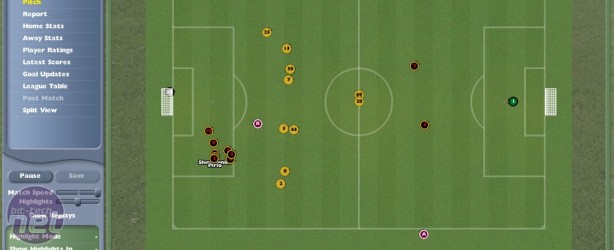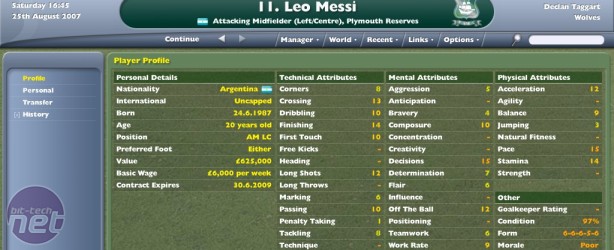Football Manager and the Fun of Failure
March 14, 2011 | 07:36
Companies: #bit-gamer #sega #sports-interactive

Football Manager and the Fun of Failing
Far too many of the quiet afternoons I treasure, in front of Bargain Hunt or Loose Women, have been spoiled by the clamour of housemates apparently brought to messy orgasm by the tension of matches in Football Manager. I used to find this quite upsetting. I should have been impressed.Football Manager games mimic the football industry through nothing more than statistics and text. All of the interaction between the player and the game is played out solely through drop-down menus and sliders, yet the series is as immersive and powerful as any FPS or interactive fiction, apparently capable of generating the sort of excitement that could make my housemates moan explicitly. That is at least a little bit impressive, even if all of the projections and extrapolations on which the game is based equate to little more than well-disguised farces.
Football Manager 2005 is my favourite game for this reason alone. It's no more evocative than its successors and, without their 3D match engine and fancy player agent gubbins, it's a good deal less authentic. It isn’t expressive of a particularly golden era for football either; it's simply the oldest title in the series. Six and half years on from its release, it is plain that what Football Manager does best is to offer up a unique alternative history, post-July 2004.
Other games fantasise, but too often their fantasies are dull or so exaggerated as to be uninteresting. What if Einstein killed Hitler? Or Nazis owned dinosaurs? What if an over-developed 1950s pop-culture aesthetic underpinned a paranoid, militaristic nationalism? Typically, it seems, blood would flow - assuming it didn't explode or become horribly radiated first. And it'd probably happen somewhere vaguely related to WWII. When FM 2005 dreams, it is at least original, albeit subtly and accidentally.
Take, for instance, the career of Lionel Messi.
In reality, Messi has twice been recognised as the greatest male footballer in the world (finishing runner-up twice before that), and is typically acknowledged as the pride of F.C. Barcelona, arguably the planet's most talented football team. At the time of writing, he has still not reached his 24th birthday.
In Football Manager 2005, he plays for Plymouth Argyle.
Of course, he doesn't actually play for Plymouth. That would be ridiculous. Sometimes, though, he does get to sit on their substitutes' bench. Having been released by Barcelona in 2006 after failing to make their first team squad, Messi is currently 'hoping to gain first team experience from going on loan.' According to Plymouth, he is a 'hot prospect for the future.' He has low morale.
It could have been worse too. On my last playthrough he ended up watching on uselessly from another subs bench as his Barnsley team-mates limped flaccidly toward relegation from the Championship. By contrast, Plymouth might make promotion to the Premier League – itself, sadly, an event more alike to the mushy hallucinations of madmen than events that really happen.
Or how about this: ever wondered what Chelsea could have achieved with the skills of Kaka and Ronaldinho making up for the presence of Frank Lampard? I used to, on a daily basis. It was like a disease, eating me up. But that was before FM 2005 offered the cure: Jose Mourinho would have been sacked a season early and Chelsea would have eventually finished four places behind the champions, Newcastle United. Obviously.

MSI MPG Velox 100R Chassis Review
October 14 2021 | 15:04











Want to comment? Please log in.